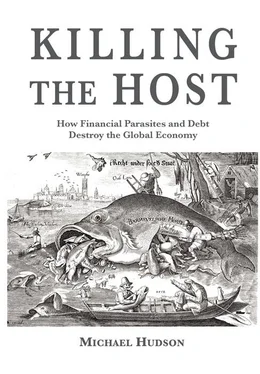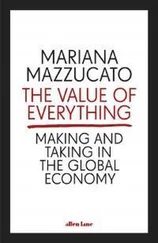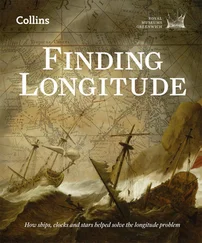The convoluted rewriting and watering down of Dodd-Frank bank legislation has shown how bank lobbyists are able to stall reforms and water them down by inserting fatal loopholes. Wall Street’s sway over lawmaking and courts, its capture of oversight agencies and political control over campaign financing forces economies to take radical steps to save themselves from austerity and debt peonage. And radical steps, by their nature, must be abrupt. To be effective, systemic reform must be done quickly and totally, not slowly and marginally.
4. Create a public banking option
Chapter 7 has shown that banking was on its way to becoming a public utility in the years leading up to World War I. A public option survives in the Post Office banks of Japan and Russia. By providing deposit and checking accounts, loans and credit cards at rates reflecting the actual cost of such services (or even at subsidized rates instead of today’s interest charges, fees and penalties), a public option could free the economy from the monopoly rent now enjoyed by banks. Most important, public banking would have been unlikely to extend credit for the corporate takeovers, asset stripping and debt leveraging that characterizes today’s financial system.
There are three main arguments for establishing a public bank to provide basic checking, savings and credit card services. The most obvious reason is to offer these services at minimum cost. A public option is free from exorbitant salaries and stock options, management fees and other financialization tactics, not to mention political lobbying and fines for the now chronic misbehavior of the largest banks.
A second reason for creating a public bank is the ability of Wall Street lobbyists to undermine administration of Sarbanes-Oxley, Dodd-Frank and the Volcker Too Big To Fail (TBTF) rule, and to block the appointment of Justice Department or Securities and Exchange Commission officials who actually believe in enforcing regulations. As long as both leading political parties view throwing financial criminals in jail as “the road to serfdom,” the only way to prevent reckless bank exploitation is to set up public banks dedicated to providing basic “vanilla” services.
The third reason for creating a public option for banking is to separate retail banking from the “investment” banking that is becoming almost indistinguishable from casino trading in arbitrage and derivatives. The failure of existing legislation to restore Glass-Steagall’s separation of these two quite different forms of banking, coupled with the inability of Congress to protect the economy from the financial sector has produced a situation where mega-banks can hold the government hostage for bailouts when the exponential growth of financial claims bursts into a repeat of the 2008 solvency crisis.
Finally, it is easier for governments to cancel debts owed to themselves than to annul those owed to private creditors. Before credit became privatized, Mesopotamian kings and Egyptian pharaohs cancelled debts owed to the palace so as to avoid widespread bondage and emigration — the fate confronting today’s debt-strapped countries.
5. Fund government deficits by central banks, not by taxes
Money always has been a public creation. The paper money in our pocket is a form of government debt. The government created it as a kind of IOU when it paid for goods and services. That is how governments supply economies with money. The holders of such currency in turn are in the position of being creditors to the rest of the economy — and pay with this credit (which is given value by the government accepting as payment for taxes). This is the essence of Modern Monetary Theory (MMT), explained best by the followers of Hyman Minsky at the University of Missouri (Kansas City), Randy Wray and Steve Keen.
The public debt — including the money supply — would not exist if the government did not run up debts century after century, just like other countries. The deficit is what creates the economy’s monetary base, which rises each year in proportion to the increase in public debt. Unlike personal debts, public debts are not expected to be repaid. To do so would extinguish the money supply. That is what happened in the late 19 thcentury in the United States, and it imposed a serious deflation (the “cross of gold” that was crucifying debtors, who earned less and less income to pay debts taken on at higher prices).
The role of central banks is to create money electronically to spend into the economy to spur economic growth without entailing interest-bearing debt owed to commercial banks and bondholders. That is why financial elites oppose central bank financing of deficits. Bondholders prefer to keep governments on a taut financial leash, with central banks creating money only to bail out banks, not the economy. Bankers accuse governments of depreciating the currency and creating hyperinflation, yet over the past thirty years banks have financed the largest inflation of real estate, stock and bond prices in history. This certainly is not a more morally responsible form of inflation than government spending.
Central banks were founded to finance deficit spending. But in recent decades the financial sector has turned them into appendages of the privatized banking system. At the Federal Reserve, “Helicopter Ben” Bernanke and his successor Janet Yellen air-dropped money only over Wall Street — a net $4 trillion of electronic credit to U.S. banks since the 2008 crisis. This Quantitative Easing did not finance investment in new industrial capital, repair deteriorating bridges, roads and other infrastructure, or maintain employment. Its aim was simply to prop up bank balance sheets by supporting prices for real estate mortgages — that is, to save banks, not the economy. Re-inflating asset prices makes it more expensive for families to buy homes, reducing their purchasing power for goods and services.
Wall Street has mounted a propaganda campaign to convince voters that government budgets should be run like household budgets: in balance or even surplus. The difference is that households cannot create money. Removing the constraint of silver or gold backing for money has enabled banks to create credit without limit, except for government regulation and capital reserve requirements. Disabling public regulatory power has left credit creation to the commercial banks, which inflate asset prices on credit, adding interest charges to the economy’s ownership structure. Asset-price inflation became the focus of bank lending — and seemed to justify yet more bank lending in came an economy-wide Ponzi scheme.
There is an alternative. The eurozone could have created a few €1 trillion platinum coins to finance deficit spending directly into the economy to help pull it out of austerity. It could have let the superstructure of bank derivatives collapse, wiping out financial gambles that put the banking system at risk. But bank lobbyists and right-wing ideologues have propagandized a narrow tunnel vision to prevent the United States from creating money for other reasons than to benefit Wall Street, and to prevent the European Union from having a real central bank to finance government deficits, except to help bankers and bondholders.
The pretense is that money is technocratic and requires professional (defined as suitably tunnel-visioned) anti-government ideologues. Ottawa economics professor Mario Seccareccia recently summarized how radical this anti-democratic view of money is:
Ever since the establishment of the modern nation-state in the late eighteenth and nineteenth centuries, the creation of the euro was perhaps the first significant experiment in modern times in which there was an attempt to separate money from the state, that is, to denationalize currency, as some right-wing ideologues and founders of modern neoliberalism, such as Friedrich von Hayek, had defended. … The denationalization or “supra-nationalization” of money with the establishment that happened in the Eurozone took away from elected national governments the capacity to meaningfully manage their economies. Unless governments in the Eurozone are able to renegotiate a significant control and access money from their own central banks, the system will be continually plagued with crisis and will probably collapse in the longer term.
Читать дальше












